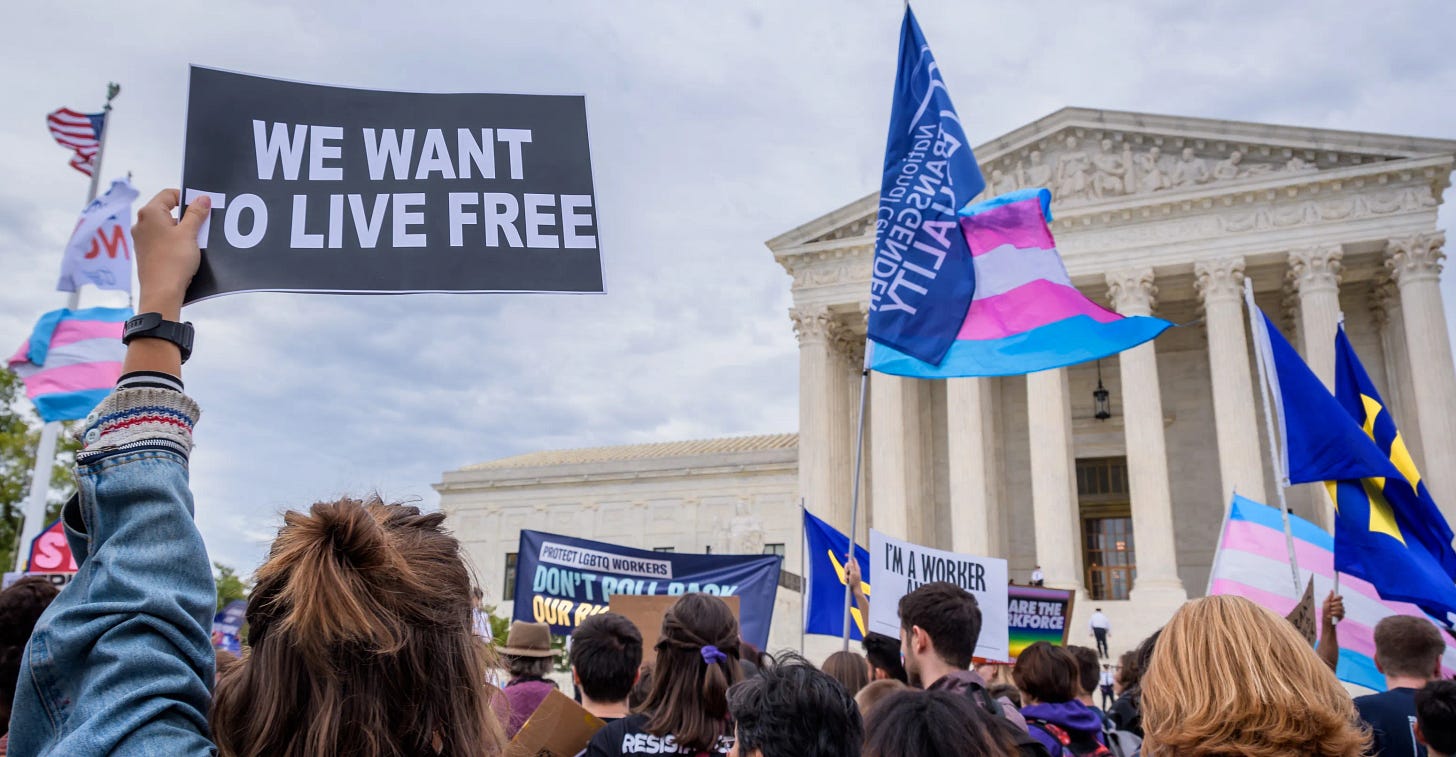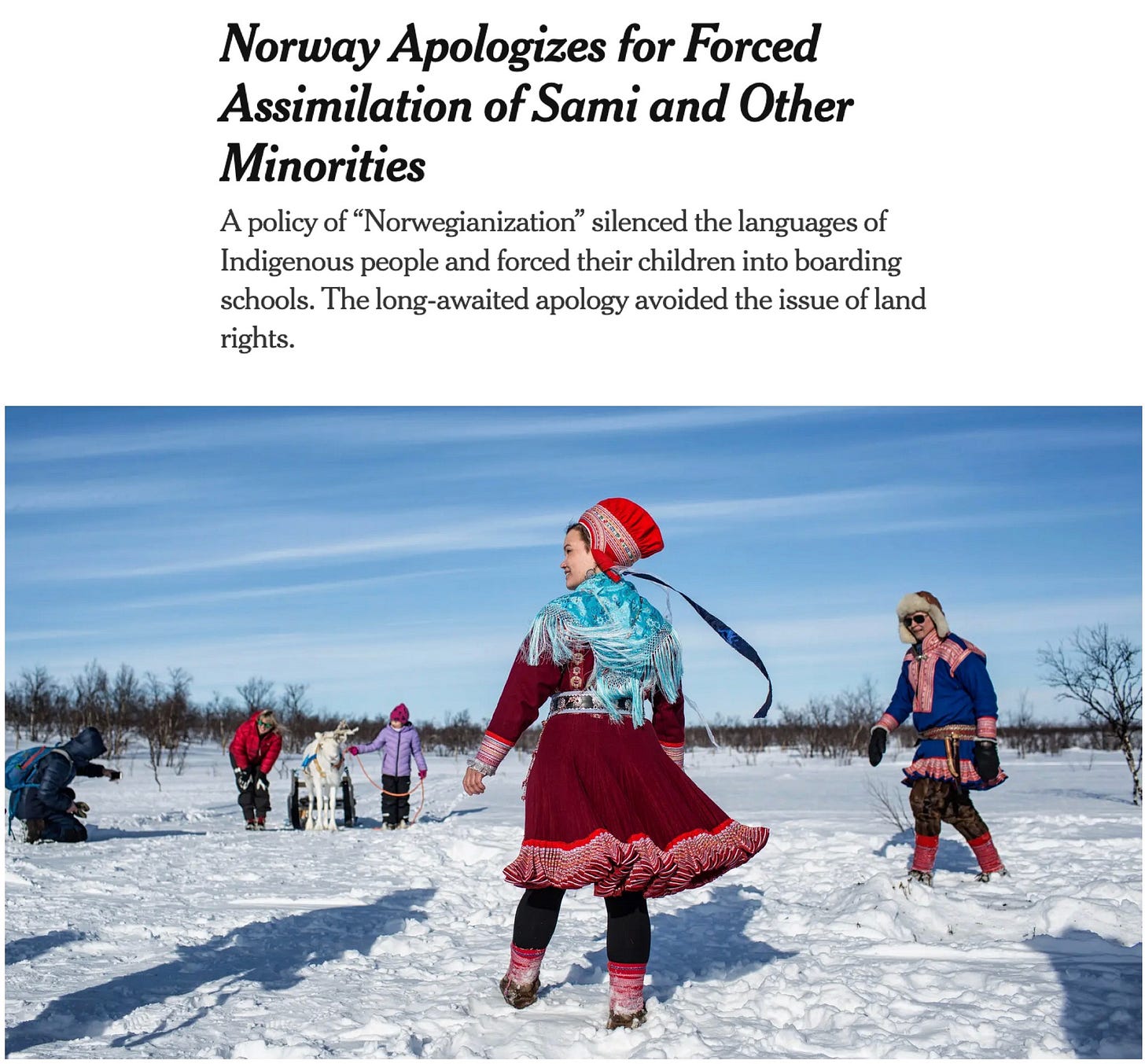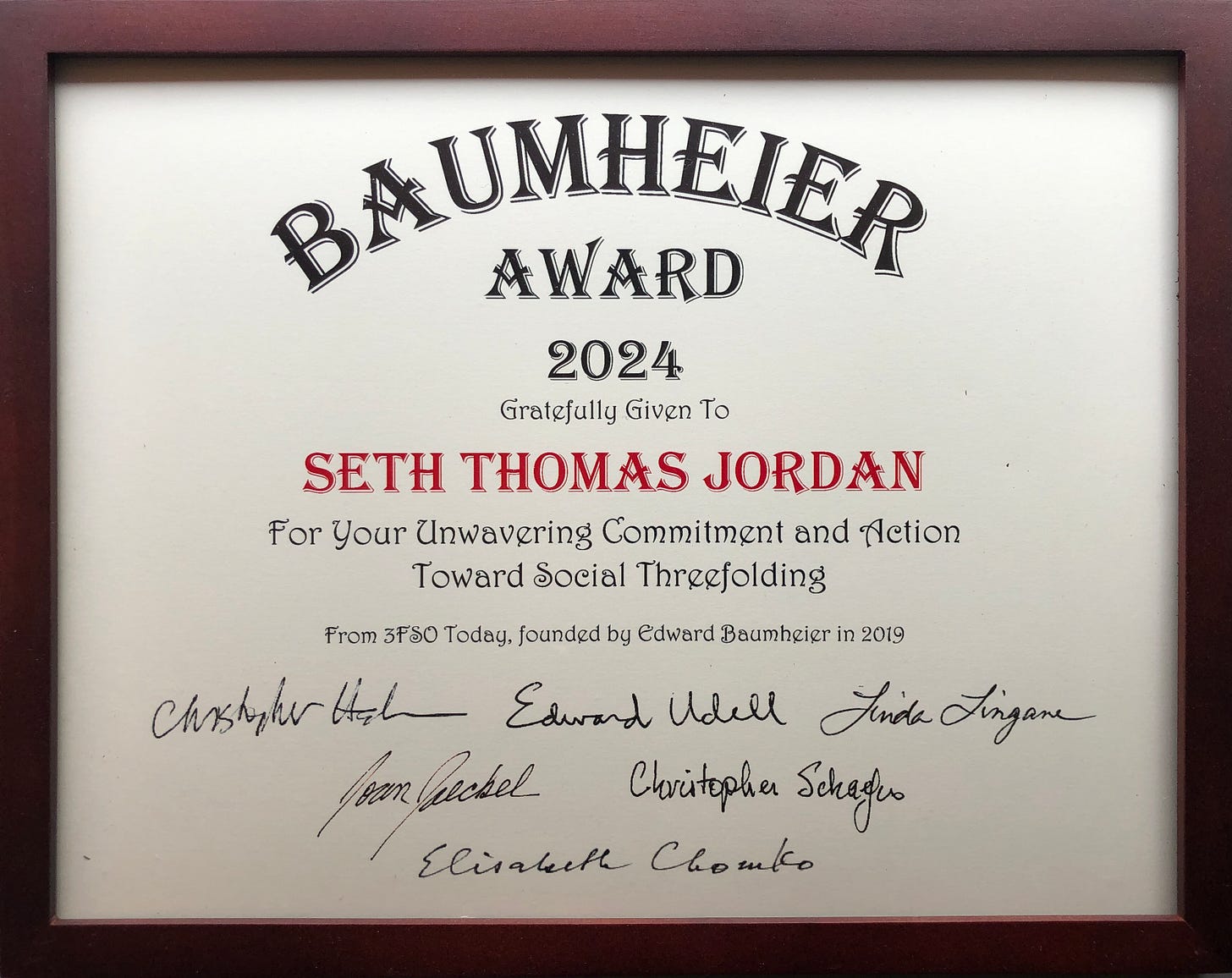Trans rights at the Supreme Court, Albania's creation of a Muslim micro-state, and TWS past and future happenings
TWS Notes on the News #6
More hypocrisy, now around trans rights
After Wednesday’s oral arguments in U.S. v. Skrmetti, it looks likely that the U.S. Supreme Court will allow Tennessee to continue its ban on gender-affirming care for trans youth. To be clear: puberty blockers and hormone therapies are still available in Tennessee for trans adults (anyone over 18), as well as for non-trans children (such as those experiencing precocious puberty), but are no longer available to anyone under 18 who wants to use them for the purpose of transitioning.
The Biden Justice Department argued against the ban on the grounds that it discriminated against a category of people based on their gender identity, and thus was a violation of the 14th Amendment’s “Equal Protection” clause, but the conservative justices seemed inclined to leave it to state lawmakers to decide.
But the elephant in the room on Wednesday was the question of parental rights. In recent years, parental rights has become a rallying cry for conservatives, with liberals largely opposing it. If this had been the main argument of the U.S. v. Skrmetti case, the tables would have been turned. Now liberals would be arguing for parental rights — the rights of parents to make decisions about their trans child’s welfare — and conservatives would be arguing against such rights.
No wonder, then, that the Biden Justice Department refused to take this approach, and that Tennessee’s lawyer explicitly stated that “the parental rights question is not before this court.” Otherwise, the hypocrisy of all our deeply held beliefs would have been on full display.
But we shouldn’t run from such contradictions in our beliefs, but seek them out. So let’s take a moment to inspect the arguments.
In recent years, many conservatives have made a strong push for parental rights when it comes to education and healthcare. “Why should the government decide what my child is taught to believe? And why should the government require my child to be vaccinated? Why can’t I decide these things? Lawmakers don’t know my child better than I do!”
Many liberals think otherwise. They don’t think conservative parents know what’s best for their children. If such parents were to decide, their children might be taught all sorts of terrible, untrue things (“just look at the news those people consume!”). And of course they fear what medical emergencies might occur if not every child was vaccinated. And so they think lawmakers should decide these things.
But of course, many liberals only think this when they’re the political majority, and therefore control the lawmakers.
And many conservatives only champion parental rights (freedom from government tyranny!) because they’re the minority in government. When they become the majority… then it’s a different story.
Take Tennessee, where there’s currently a conservative majority: Should a parent have the right to decide their child’s healthcare when it comes to gender-affirming care? The liberals cry “Yes! — why should lawmakers decide what my child does to their body?!” And the conservatives shout “No! — those people have no idea the irreparable harm they’re doing to their children (and really, how could they? — just look at the news they consume!).”
Of course, many people reading this will naturally have a left or right bias, and will simply shrug at this inconsistency in their beliefs. They will say, “Who cares? Don’t you know their side is evil! My side loves the children. We’re just trying to do what’s best for them!”
That’s the deeper logic behind all our vaulted ideals. Our side is right and good. And their side is wrong and evil. Ideals, such as freedom, are mostly just window dressings to be discarded when they no longer serve us. (We feel the need for freedom so strongly when our own freedom is being oppressed. But do we still feel it when our enemy’s freedom is being taken away? Not at all.)
But we should learn to take our hypocrisy seriously — to see it as a certain weakness in our thinking, a slipping into the warm comfort of group-think — and try to stand a little apart, try to see things a little more clearly for what they are. Maybe the other side isn’t so evil. And maybe our love for the children (or immigrants, or the working class, or the unborn…) is not so strong and profound as we imagine it to be.
I know many readers will be frustrated that I’m not saying anything about the trans issue itself —whether gender-affirming care is ultimately helpful or harmful to individuals — which is what most writers talk about, and so what most readers want to hear about. Of course I have thoughts on such things, but my main interest is in the health of society, and society is harmed when it stops people from making their own choices.
When it comes to the individual’s own life — their personal life — we have to leave people free to decide, not ban their bad decisions. It simply won’t work. People will go underground, find somewhere else to transition or get an abortion or buy ivermectin. They’ll find another messaging app to talk about white nationalism. It’s just a hopeless case of ‘whack a mole.’ We can’t erase people.
But we can convince them. Cultures change over time. What was once unheard of becomes widespread, and vice versa. This is the path to a healthy society. We have to try to educate, not legislate, each other. We have to let individuals make their own choices about their own lives. We have to have some basic respect for each other.
Albania’s good intentions only further illustrate the absurdity of the nation-state idea
One of the things I’ve often argued on The Whole Social (and which I just argued in the above piece on trans rights) is the need to separate culture and state: when government is involved in cultural life (in education, scientific research, medicine, etc.), then cultural life is corrupted. Just think of state-run media. In our time, the individual human mind must be free to follow its own direction. The majority can’t tell us what to believe, research, read, write, or teach.
One expression of this principle is the need to separate nation and state. Nation refers to a specific ethnic-cultural group. When such a group is merged with the state (in the form of a nation-state), then its culture becomes the dominant culture of the country, creating a constant pressure for other cultures to assimilate — to leave their own beliefs, traditions, and languages behind.
This creates the conditions for constant war — either the kind of simmering culture wars we find in the U.S. and globally, or else the fully boiling physical wars that are playing out in Israel-Palestine and Ukraine.
(Particularly vulnerable in this struggle are isolated minority cultures who can be rounded up and “re-educated” — the Uyghurs and Tibetans in China, the native communities in America and Canada. And now a recent Truth and Reconciliation process in Norway has shown that the same thing has also taken place with the native groups there.)
This is the norm throughout the world: larger cultural groups violating smaller ones, and using the nation-state as their weapon of choice. But in a surprise move this past September, Albania seemed to buck this trend. Instead of making the news for brutally suppressing one of their minority groups, they made the news for elevating them… and giving them their own nation-state!
Prime minister Edi Rama told reporters that the government was planning to create a “micro-state” within the Albanian capital of Tirana (similar to the Vatican in Rome, though only a quarter of its size) for a small sect of Sufi Muslims known as the Bektashi.
Why create such a state? Because Mr. Rama feels that other Muslim states are overly radical and conservative, and he wants to show a different face of Islam by creating a “new centre of moderation, tolerance and peaceful coexistence.”
On the surface, the creation of the ‘Sovereign State of the Bektashi Order’ seems like a a rare act of charity, a blessing for a small religious group that has been viewed as heretical by other Muslims groups. But is it?
No, because the nation-state is only ever a curse. It will not elevate a vision of greater tolerance but only create the conditions for greater hostility. It will seed jealousy in the hearts of their Albanian neighbors. They will say, Why should the Bektashi become independent? Why should they receive their own state?
You might wish that other groups would rise above such petty jealousies and be happy for their neighbor’s good fortune. But if it’s truly a good thing that they’re receiving from Albania, then why shouldn’t everyone receive it? Why shouldn’t the Sunni Muslims, the Catholics, and Orthodox Christians have their own micro-states as well? And what about all the different ethnic groups? There’s a large Aromanian population who don’t even have their own nation-state anywhere in the world — why shouldn’t they also receive their own micro-state?
This is what the nation-state idea does — split the world into smaller and smaller ethnic-cultural units. These units, these countries, will always have other ethnic-cultural minorities within their borders, and those minorities will always want to split the country into still smaller units.
But the story of Albania is useful for illustrating another truth: good intentions don’t ensure good results when it comes to social change. I have no reason to doubt the benevolent ideals behind Edi Rama’s plan to create a Bektashi micro-state, but if the dynamics of society aren’t truly understood — if one tries to create something in social life that doesn’t align with social reality — it will almost always cause harm in the long-run.
Some wonderful recognition — the Baumheier Award
Last month, I was part of a panel at the Baumheier conference, and at the end of the event I was given an award for my “unwavering commitment and action toward social threefolding.”
This is a really wonderful recognition to receive. Threefolding is so little known in the world, and the people working for it are so few and so spread out, that it can be hard to feel like one is having an effect. So it means a lot that members of this community have created an award to recognize people’s efforts in this direction.
I’m very grateful for the folks at 3FSO Today who have created this award, as well as the Baumheier conference and their myriad other projects. Thank you for all that you’re making possible!
Upcoming event in Wisconsin (and maybe also some talks in New York and California…)
In a little over two months, from February 20th-23rd, I’ll be part of another workshop in Wisconsin with Robert Karp Karbelnikoff and the good folks at Threefold Driftless.
This workshop will be called “We the People,” and in it we’ll seek to address the intense polarization that’s so widespread today. We’ll be working with different approaches (including the “Depolarizing Within” approach of Braver Angels), and also looking much more closely at the U.S. constitution and ways it could be changed to meet today’s challenges. If you’re interested in attending, you can find more info here.
Also, it looks like I’ll be giving a few talks in January and February in New York and California. If you’re interested in attending any of those, keep your eyes on this space — I’ll probably share those announcements alongside an article sometime in the new year.
And as always, thanks for reading The Whole Social!
Yes, writers have to eat, but paywalls just punish low-income people, and why shouldn’t they have access to the writing and ideas they want?









Congratulations for the reward - you deserve it! And you are right, few people are talking about three folding nowadays, but the time seems so ripe to begin the conversation. Systems are not working like they used to, the world is being pushed to change and usually in murky waters new ideas are born and people are frustrated enough with the group think to give them a chance to grow. Keep your good work going, Seth! It may seem that people who are interested are few and far apart but you know how it is with ideas - they need to be maintained and plumped up and suddenly everyone is onto them.
Toawrds the end of the article the assertion is made "Of course I have thoughts on such things, but my main interest is in the health of society, and society is harmed when it stops people from making their own choices." This view is on the libertarian end of the spectrum, which is probably where I come in on.
There is, nevertheless, some room for nuances here. Are we moving the needle in that direction consistently? In other words, Would it also be acceptable for parents to let their 15 year old drive, because the parents and the minor all agree that they can manage driving a vehicle without causing harm to others? (My dad was driving a delivery truck at age 14 back in the day).
Here is another example: What about a 17-year-old wanting to join the armed forces and the parents think it a good idea? A seven-year-old? And another possible example: Parents decide that their kids can have whiskey. (This is perfectly acceptable in some countries). I am asking Seth and other readers: Are my examples false equivalents, or do they carry any weight?
I also agree that if people want something badly enough they will go somewhere where they can get it. This was in evidence when my state (NY) recently mandated a staggering number of vaccines for school age children, and folks who opposed that went underground or moved elsewhere. But is that the final solution? If we can't get what we want, we move or hide? What would be another way to address these questions? Tennessee evidently outlawed all gender affirming care for minors. That is the most severe restriction that I can imagine. It could have made it illegal for the government to pay for such care , which would then have made the service exclusive, but not illegal. That position is at least somewhat consistent with a Libertarian philosophy.
I am pondering the question, which is basically "What do we do about the State of Affairs until we all get it right with the new enlightened conscioussness of Social Threefolding?"